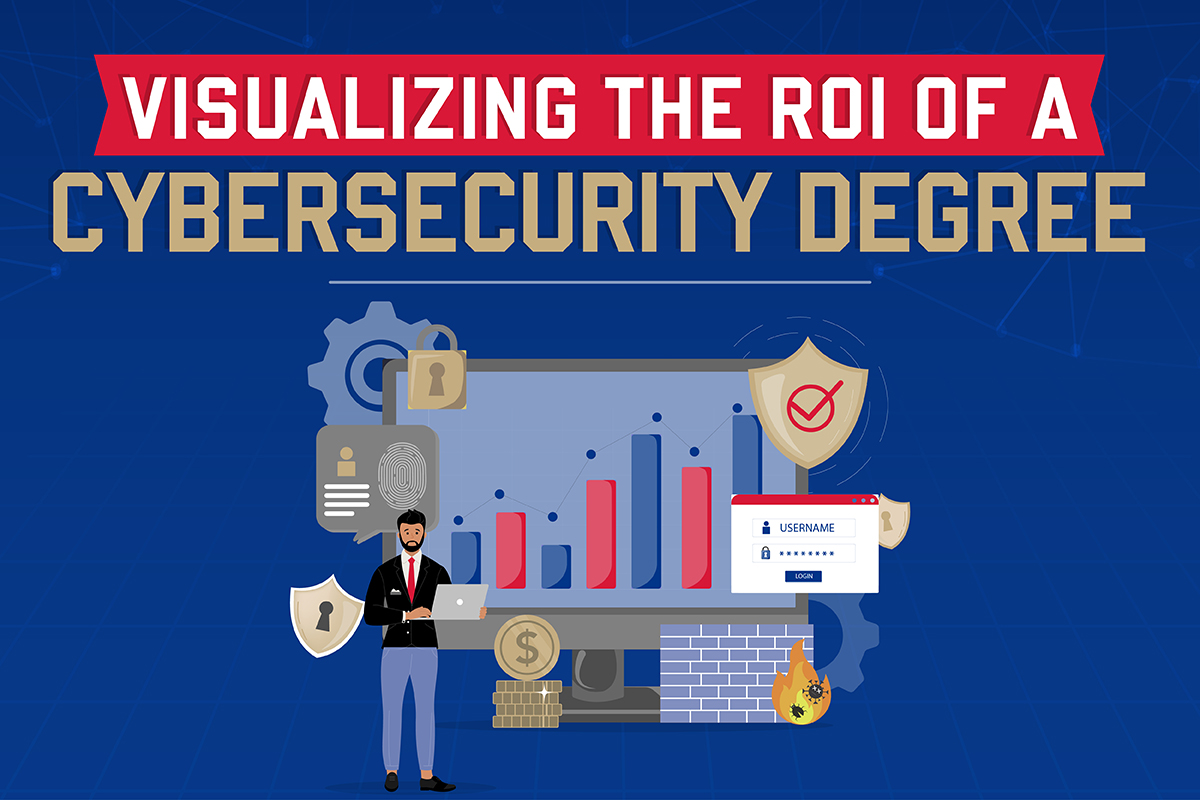Cybersecurity vs. Computer Science: Career Opportunities and More
Written by:
University of Tulsa
• Mar 22, 2024

With organizations continually adopting new technologies to improve productivity and remain competitive, internet-enabled devices and digital networks are a mainstay in today’s modern business environment. In the ever-evolving landscape of technology, two fields — cybersecurity and computer science — stand at the forefront, each playing a distinct yet interrelated role in shaping our digital future.
While both are integral to the functioning of our technology-driven society, they differ in focus, methodologies, and objectives. This cybersecurity vs. computer science comparison will define each information technology (IT) specialty and shed light on key similarities and differences. It’ll also address common career paths that aspiring IT professionals can explore and how an advanced degree in cybersecurity can facilitate their journey.
What Is Computer Science?
Computer science is a broad discipline that encompasses the study of computers, computing, algorithms, data structures, hardware, software, and the theoretical foundations of computation. It comprises a wide range of subfields, including software development, artificial intelligence (AI), and networking, with the primary goal of understanding the principles and mechanisms that drive computing systems.
Because the field of computer science is so vast, most individuals choose an area to focus on. Popular specializations include the following:
- Computer architecture
- Programming languages
- Coding
- Distributed systems
- Databases
- Computer networking
- Operating systems
Whatever specialization they choose, computer scientists share a solutions-oriented approach to computing. They explore problems and address inefficiencies in computing by developing theories, conducting experiments, creating new computing languages, and collaborating with engineers and other scientists.
What Is Cybersecurity?
Cybersecurity is a specialized field of computer science that focuses specifically on safeguarding digital systems, networks, and data from cyber threats. Its primary objective is to protect information and ensure the confidentiality, integrity, and availability of digital assets in the face of malicious activities.
As technology evolves, so too does the complexity of cyber attacks. Securing networks and devices requires constant oversight and vigilance. The most common cybersecurity measures include the following:
-
Updating hardware and software
-
Installing antivirus software
-
Implementing password best practices
-
Securing endpoints
-
Installing firewall
-
Implementing multifactor authentication (MFA)
-
Developing a data and disaster recovery plan
-
Educating users on cybersecurity best practices
In 2023, the average cost of a data breach was $9.4 million, with more than 3,200 data compromises affecting 353 million individuals, according to Statista. Considering the cost and frequency of cyber attacks, organizations are more conscious than ever about their cybersecurity efforts.
Cybersecurity vs. Computer Science: Similarities and Differences
When making a cybersecurity vs. computer science comparison, you’ll find that the two fields share some common elements, while others set them apart.
Similarities Between Cybersecurity and Computer Science
Cybersecurity and computer science share a foundational connection in computing. Cybersecurity is a specialized branch within the broader spectrum of computer science, relying on its principles, theories, and methodologies to address specific security challenges.
Additionally, both fields are interdisciplinary in nature, often requiring professionals to have a broad understanding of various computing concepts. This includes knowledge of programming languages, system architectures, and data structures, which are foundational elements in both cybersecurity and computer science.
Finally, the dynamic nature of technology ensures that professionals in both fields must engage in continuous learning. Whether it’s by staying updated on the latest programming languages in computer science or monitoring emerging cyber threats in cybersecurity, a commitment to ongoing education is essential.
Differences Between Cybersecurity and Computer Science
The primary distinction between cybersecurity and computer science lies in their areas of focus and their objectives. Computer science is concerned with the development and understanding of computing systems, software, and algorithms. In contrast, cybersecurity is solely dedicated to protecting these systems and data from unauthorized access, attacks, and breaches.
Another major contrast is the scope of each field. While computer science encompasses a broad range of disciplines, cybersecurity is a specialized niche within computer science. Cybersecurity professionals often focus on areas such as network security, penetration testing, or cryptography, tailoring their expertise to address specific security challenges.
Finally, the tools and techniques employed in each field differ based on their respective goals. Computer science professionals may use programming languages and development tools to create software, while cybersecurity experts leverage tools such as firewalls, intrusion detection systems (IDSs), and ethical hacking techniques to secure systems and networks.
Computer Science and Cybersecurity Career Options
Career-minded individuals with a natural interest in computing will find that computer science and cybersecurity professionals are in high demand. Computer and information research scientist roles are projected to grow by 23% and information security analyst roles by 32% between 2022 and 2032, according to the U.S. Bureau of Labor Statistics. To put that in perspective, the average projected growth rate for all occupations combined in that period is just 3%.
While the field of IT and computing shows long-term job security, individuals must consider where they wish to specialize. Those with a computer science background can pursue roles as web developers, data engineers, network architects, or programmers. Individuals with a cybersecurity degree and training qualify to become IT security specialists, penetration testers, incident managers, and chief information officers (CIOs).
Embark on a Rewarding Career in Cybersecurity
An evaluation of cybersecurity vs. computer science makes clear that both play essential roles in the technological landscape, although with different contributions. Computer science is the driving force behind innovation, addressing problems and pushing the limits of what modern computing can accomplish. Cybersecurity is the shield that safeguards sensitive data, private networks, and hardware against internal and external threats.
Both those who currently work in the computer science field and those who are exploring IT careers for the first time will find that education fosters opportunity. The University of Tulsa’s online Master of Science in Cyber Security program teaches the most in-demand skills and competencies of cybersecurity in a streamlined and convenient format. Working professionals can complete the accelerated program in as little as 20 months.
In addition to learning the foundational concepts and key fundamentals of cybersecurity, students have the choice between a technical and leadership learning track, providing a solid foundation for postgraduate career pursuits.
Find out how The University of Tulsa’s cybersecurity program can support your long-term career growth.
Sources:
Cybersecurity & Infrastructure Security Agency, What Is Cybersecurity?
Indeed, “Cybersecurity vs. Computer Science: What’s the Difference?”
Indeed, “How To Learn About Computer Science (With Tips and Benefits)”
Statista, Average Cost of a Data Breach in the United States From 2006 to 2023
U.S. Bureau of Labor Statistics, Computer and Information Research Scientists
U.S. Bureau of Labor Statistics, Information Security Analysts


